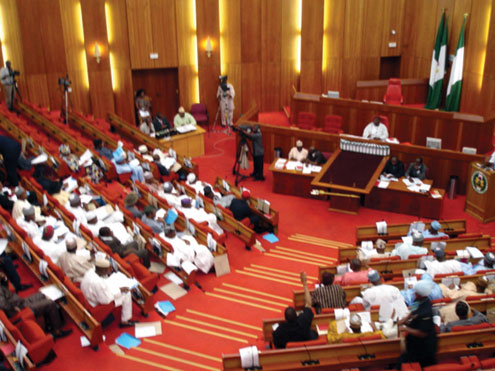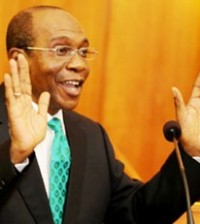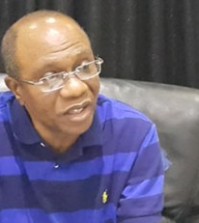CBN contributed to bank collapse – Ex ED, Afribank
For 43 years – 1965 to 2002 – Alhaji Ismaila Shuaibu traversed the banking corridor in Nigeria. Beginning as a clerk with former Barclays Bank of Nigeria now Union Bank in Kaduna, he retired as ED in Afribank in Lagos. In between, he had been posted on secondment to other financial institutions to intermittently pull them out of the doldrums. Now in retirement but still doing private business, Alhaji Shuaibu reflects on the state of the banking sector with nostalgia.
Weekly Trust: We would like you to compare banking in the past and now.Alhaji Ismail Shuaibu: Banking actually has transformed itself. It is not as it used to be. Technology has taken over. In our days, of course, there was technology, but not as advanced as it is now. And with the whole world becoming a global village, banking being part of the world has gone global. Money transfer and other transactions in the past took days before confirmation, for example, but these days, everything is automatic. There is a huge difference even in personal service, personal touch between customer and manager. In the past, it was easy to see your manager and talk to him, these days anything you want you go to the machine, it is there. These days if you go to banks to withdraw cash above certain limit, you are charged because they expect you to use the ATM which was not so in the past. Now people seem to be in a hurry, they have many things to do, technology is like handy.
But each one has its merit and demerits. People no longer even find time to check their balances. Before, people scrutinize their balances; check their charges, etc. These days, so many types of charges are put into various accounts and customers rarely check, they lose touch of what they are paying; therefore, the institutions are making too much money. When I look at the audited balance sheets of banks, and I see the huge profit they make – profit before tax, I mean gross profit, it is huge, then profit after tax – banks are making money. But one wonders where these monies disappear to. They say they pay for technology, security, this, that, and at the end, the shareholders do not receive enough returns.
You sound as though it is a negative transformation, what could have been responsible for this?
Well, banks claim getting the right personnel costs money, but looking at the labour market today, why should it cost so much? People might dismiss me as being old fashioned but the truth is, bankers are being highly over paid. I can’t imagine…someone earning up to 70- 100 million Naira per annum! Not stopping there, banks again share out profits and so on and so forth at the end of the year. In fact, these profit sharing ratios are the things bringing some banks down, because they are not actual profits –but paper profits. We know that if you make certain profit, you are entitled to certain percentage, there are dividends being paid to shareholders, etc, but in this case, banks are giving out cash where there is none because the profit being claimed is not actual profit, it is paper profit. If you can remember, there were some banks that every year went to the markets because they have some deep holes, they don’t have liquidities, and some even borrow money twice a year. They do that with so much hype, they work on the psychology of people, they talk of dividends, bonuses and then they manipulate the capital market, then they make the prices of shares to be going up unnecessarily – not the true prices. All these were happening not only in the banks, including the Stock Exchange.
Given the comatose nature of our industrialization, do you think the banks would have saved the situation?
The banks ought to have been driving the economy. They have to drive the economy. There is no accountability in this country. Projects are not completed, but monies are allocated. Banks give advances to people who would not return the money. Instead of clients performing what they borrowed money for, they put it in their pockets. Everything, as a result, keeps collapsing including the banks and industries.
What do you think the Central Bank would have done?
The unfortunate thing is that the Central Bank really contributed to the collapse, because it is the body that was supposed to be monitoring. Corruption has gone through the fabric of the society. The CBN inspectors instead of doing their jobs were compromised. We have had instances where money was passed to them and they became very rich. The CBN then was a culprit. If they had done their jobs well, some people would have been arrested and set as example. Fortunately, when Sanusi came, he realized this and has tried to arrest the situation. He brought out some culprits and that made others to sit up. And it was not as if the others were clean, but they were not as dirty as the ones that were penalized.
But there was a time the CBN intervened just as it did recently when it created these 25 mega banks…
The banks were undercapitalized, that was why CBN approved their capital base at 25 billion Naira. Therefore, some banks collapsed into others. The essence for that was for them to have a firm capital base to compete globally. And if you translate our capital base in Naira, our Naira was depreciating, therefore we cannot compete globally with other banks. That action was good. Unfortunately, some of them did not meet up, some even used goodwill …
Goodwill like how?
Of course, everybody knows goodwill, but the thing is why should they use it? They were asked not to pay dividend until they wipe off the goodwill. Some of them continued to show paper profit, which within one year they wiped off the goodwill.
What was the Bankers’ Committee doing to tackle the short coming?
I believe they have been discussing problems and ways through which they could solve those problems. The problem in Nigeria is that you conceive good ideas, but implementing becomes a problem.
The concept of the microfinance banking is still awaiting implementation, why do you think it is so?
To date, the CBN Governor says he is working on ways to make them stable. These banks are supposed to reach where the normal banks are not reaching. They are supposed to operate in the simplest ways. Am sure you have heard of Bangladesh where they have this type of banking option. It is like the asusu which we have transformed. Here we have taken it as a normal conventional bank. The MFBs are supposed to be fed with small-small savings/deposits. The deposits are then to be used in funding local people to empower them, raise their standard of living at least from poverty level, to be useful to them, but where you find MFB established in a city being run like a normal bank, it is wrong. They treat their managers like in a normal bank, they don’t have that capacity, they give them cars, hire a beautiful place – even that house that is hired already puts it in deficit, because it has gone beyond the capital base of the bank. What kind of business are you going to run when it is supposed to fund artisans, mechanics, tailors, petty traders, etc? MFB customers are people without collaterals, so if you are going to work with such people, you must find means of getting them accountable. How do you do that? You group them into cooperatives to guarantee each other or you get the guarantee of at least their district head that knows them. They are people who do not have the acumen of anything; in fact, you have to teach them the rudiment of even keeping records not even account books. It is a complex thing, but then you find some MFBs owned by individuals, maybe the shareholder is one person, and then he collects the savings and puts it in his pockets and goes away. He runs the bank single-handedly, as soon as funds are mobilized, he comes in, collects them and goes. That is why they have collapsed.
Recently, there was a call from the World Bank for Nigeria to devalue the Naira, do you think there is justification for that?
If you are producing and exporting and competing globally, you can devalue to make your products cheaper, but that does not mean the quality should be lowered. We are not exporting. We are consumers. We are major importers; therefore I cannot see any justification for devaluing the Naira. But when there is so much physical expenditure and creating deficit by the government, it means government is creating paper money. Also, where corruption is at its highest, people have no value for money. For example, if this small plot is valued at 1million Naira, and let’s assume, someone who did not sweat to get the funds, probably he stole money, does not mind paying five million Naira for it. If someone pays that amount for such a small land, now it becomes a yardstick for another person to sell higher. Also, people inflate contracts. They are devaluing the Naira. Money laundry is also affecting value of our money. You find people saying they are businessmen, but there are no proofs for these, they are agents of corruption. They are devaluing the Naira. That is why the World Bank, viewing how we are living, may have been making that call.
Source : Guardian








